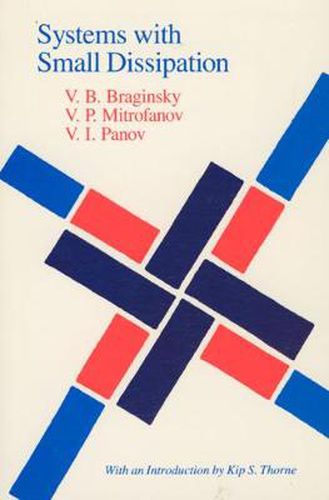Readings Newsletter
Become a Readings Member to make your shopping experience even easier.
Sign in or sign up for free!
You’re not far away from qualifying for FREE standard shipping within Australia
You’ve qualified for FREE standard shipping within Australia
The cart is loading…






Electromagnetic and mechanical oscillators are crucial in such diverse fields as electrical engineering, microwave technology, optical technology, and experimental physics. For example, such oscillators are the key elements in instruments for detecting extremely weak mechanical forces and electromagnetic signals are essential to highly stable standards of time and frequency. The central problem in developing such instruments is to construct oscillators that are as perfectly simple harmonic as possible; the largest obstacle is the oscillator’s dissipation and the fluctuating forces associated with it.
This book, first published in Russian in 1981 and updated with new data for this English edition, is a treatise on the sources of dissipation and other defects in mechanical and electromagnetic oscillators and on practical techniques for minimizing such defects. Written by a team of researchers from Moscow State University who are leading experts in the field, the book is a virtual encyclopedia of theoretical formulas, experimental techniques, and practical lore derived from twenty-five years of experience. Intended for the experimenter who wishes to construct near-perfect instrumentation, the book provides information on everything from the role of phonon-phonon scattering as a fundamental source of dissipation to the effectiveness of a thin film of pork fat in reducing the friction between a support wire and a mechanically oscillating sapphire crystal.
The researchers that V. B. Braginsky has led since the mid-1960s are best known in the West for their contributions to the technology of gravitational-wave detection, their experimental search for quarks, their test of the equivalency principle, and their invention of new experimental techniques for high-precision measurement, including quantum nondemolition movements. Here, for the first time, they provide a thorough overview of the practical knowledge and experimental methods that have earned them a worldwide reputation for ingenuity, talent, and successful technique.
$9.00 standard shipping within Australia
FREE standard shipping within Australia for orders over $100.00
Express & International shipping calculated at checkout
Electromagnetic and mechanical oscillators are crucial in such diverse fields as electrical engineering, microwave technology, optical technology, and experimental physics. For example, such oscillators are the key elements in instruments for detecting extremely weak mechanical forces and electromagnetic signals are essential to highly stable standards of time and frequency. The central problem in developing such instruments is to construct oscillators that are as perfectly simple harmonic as possible; the largest obstacle is the oscillator’s dissipation and the fluctuating forces associated with it.
This book, first published in Russian in 1981 and updated with new data for this English edition, is a treatise on the sources of dissipation and other defects in mechanical and electromagnetic oscillators and on practical techniques for minimizing such defects. Written by a team of researchers from Moscow State University who are leading experts in the field, the book is a virtual encyclopedia of theoretical formulas, experimental techniques, and practical lore derived from twenty-five years of experience. Intended for the experimenter who wishes to construct near-perfect instrumentation, the book provides information on everything from the role of phonon-phonon scattering as a fundamental source of dissipation to the effectiveness of a thin film of pork fat in reducing the friction between a support wire and a mechanically oscillating sapphire crystal.
The researchers that V. B. Braginsky has led since the mid-1960s are best known in the West for their contributions to the technology of gravitational-wave detection, their experimental search for quarks, their test of the equivalency principle, and their invention of new experimental techniques for high-precision measurement, including quantum nondemolition movements. Here, for the first time, they provide a thorough overview of the practical knowledge and experimental methods that have earned them a worldwide reputation for ingenuity, talent, and successful technique.